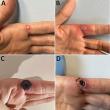
The Pennsylvania Department of Health has issued a health alert regarding a rise in the number of cases of mpox, formerly known as monkeypox, in Philadelphia.
Preliminary data shows there have been 17 cases of mpox in the city since late November, averaging four new cases per month since Thanksgiving.
According to the Centers for Disease Control, mpox spreads through intimate, close contact with someone who is infected with the virus through sex, kissing or prolonged face-to-face interactions. The virus can be severe and lead to greater health complications and may become fatal.
According to the department of health's website, "Mpox symptoms often begin with a rash but sometimes people have flu-like symptoms before the rash appears."
Nearly all of the mpox-related deaths in the U.S. were among Black men, and almost all had weakened immune systems, the CDC reported last year.
Reported by CNN, in the timespan between May 2022 and March 2023, 30,235 people were diagnosed with the virus in the U.S. Thirty-eight deaths were linked to mpox — 36 of them were men, and 33 were Black men. The average age of those who died was 34.
“There is concern for a further increase in cases as the summer approaches,” the Pennsylvania Department of Health said in its statement this week.
The best defense against mpox is the JYNNEOS vaccine. The virus is most commonly found in the Democratic Republic of the Congo in central Africa, as well as in West Africa.
The CDC recommends that people with risk factors for mpox be vaccinated with two doses of the JYNNEOS vaccine, separated by at least 28 days. The vaccine is expected to be commercially available this month, and will available at District Health Center No. 1 and most Rite Aid pharmacies.
Though the LGBTQ community has the highest risk for mpox, as well as people with HIV or other auto-immune suppressive conditions, the health department said the vaccine is also appropriate for anyone "from a geographic area where mpox transmission is occurring."
“Mpox lesions may be small, firm, rubbery, deep-seated, and well-circumscribed, or they may be large, with diffuse, centrifugal lesion distribution,” the health department said.
“Currently there is an ongoing outbreak of a potentially more severe version of mpox called Clade I Mpox in the Democratic Republic of the Congo, which has raised concern for the potential of importation of Clade I Mpox to the USA,” said the alert from the state health department.
Patients with mpox should seek professional treatment and should be isolated with a private bathroom, according to the health department.
“Precautions must be maintained until the infection is ruled out or all of the lesions have crusted, those crusts have separated and a fresh layer of healthy skin has formed underneath,” according to health department officials.
Portable fans should not be allowed in a patient's room to avoid the possibility of re-suspending dried materials from lesions and the patient’s door should be kept closed.
The CDC also issued a travel health notice for people traveling to the Democratic Republic of the Congo.
"People who have traveled to the DRC should seek medical care at once if they develop a new, unexplained rash or lesions on any part of the body — with or without fever or chills," the agency warned.






